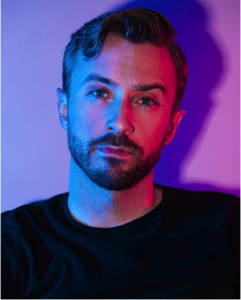
A self-described “dorky dad,” Peter Hollens is an American singer, songwriter, and producer best known for his a cappella cover songs on YouTube. His online videos have reached more than 400 million viewers since he started posting in 2011, and his eponymous YouTube channel has surpassed 1.5 million subscribers.
“I believe that the future of music is one in which it goes hand-in-hand with technology,” said Hollens of his success as a new creator and online music artist. He also teams up with other YouTube artists like violinists Lindsey Stirling and Taylor Davis. “The next golden era of music and creation in general has to occur vis-a-vis technology. You can’t say that it’s analog. It doesn’t make sense anymore. You have to look forward.”
Hollens uses a wide variety of online platforms — everything from Spotify and SoundCloud to YouTube and other social media channels — to reach millions of fans and earn revenue from his music. For his popular cover songs of Disney tunes, the Star Wars theme, and other artists, Hollens relies on the fair use doctrine to build upon other artists’ creations and transform them into new works.
Hollens has also encouraged his fans to build off of his own works. Last year, he initiated a cover contest, urging fans to create and submit their own videos based off an original song from his Christmas album. He received 525 entries, of which he believed the vast majority were fans’ first forays into the online music space. “I feel like you have to teach and encourage people to start, and when they do, creativity is only going to exponentially grow,” he said.
Hollens is a strong believer in the power of working alongside artists by covering their original works. In his eyes, this allows both parties to succeed in regards to monetization and brand recognition. “It’s not about ‘saving’ the original work, it’s about expanding its reach and allowing all artists to profit from more creation and more content,” he said.
Some critics of online music have proposed policies like “notice-and-staydown,” which would hold tech companies like Facebook, YouTube and Etsy responsible and liable for the copyright infringement of their users. Citing the Digital Millennium Copyright Act’s safe harbor provision as a key reason for his online success, Hollens is concerned that a copyright system with “notice-and-staydown” would lead to over cautious and overly broad copyright policies, place undue burdens on tech platforms, and result in a decline in online creativity.
Overall, Hollens wants to make sure copyright law allows more people to do what they love for a living. “We’re born creators. We’re supposed to be doing this,” he said.
Learn more about Hollens’ work by visiting peterhollens.com and following him on YouTube and Facebook.